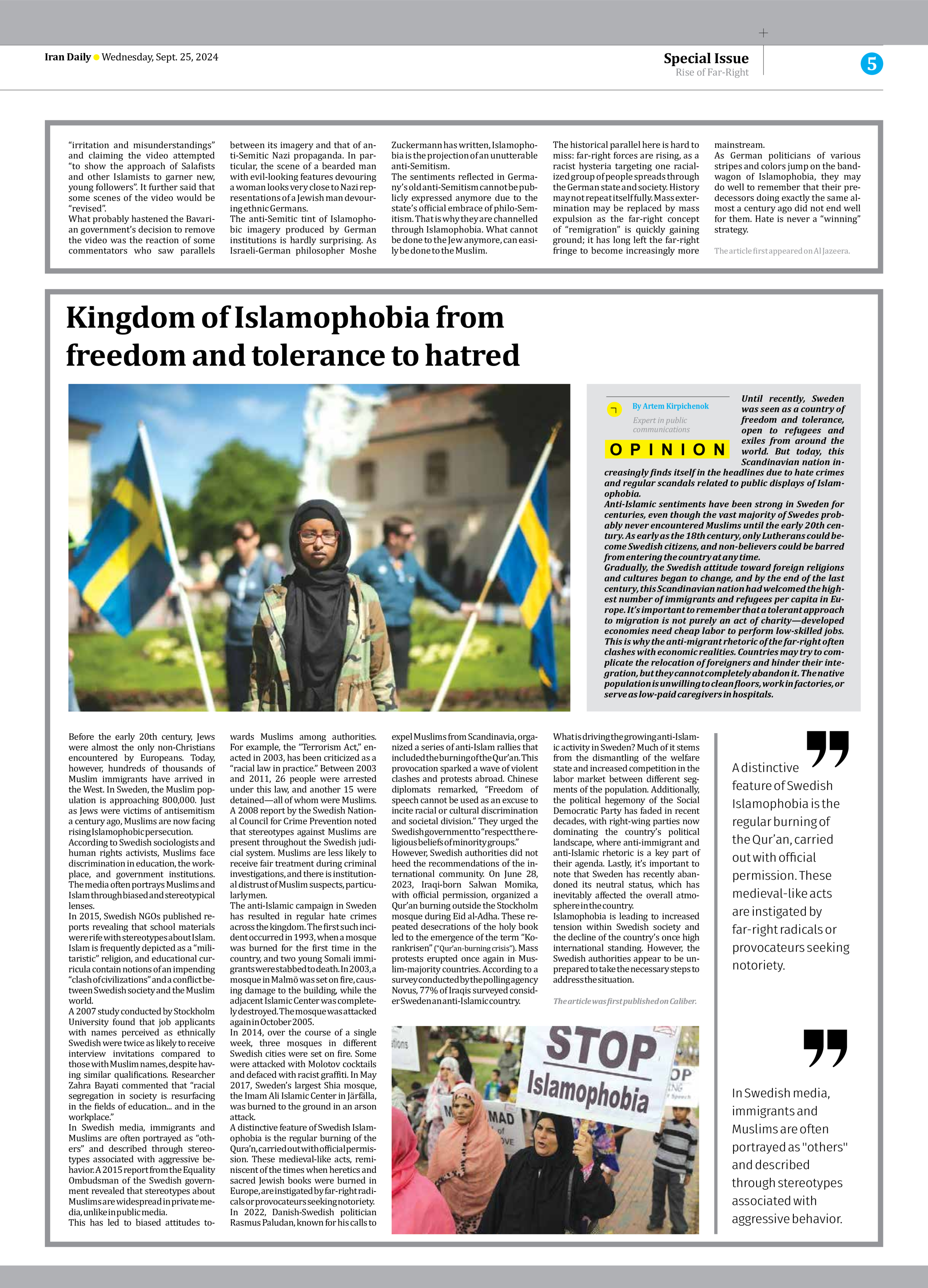
Kingdom of Islamophobia from freedom and tolerance to hatred
By Artem Kirpichenok
Expert in public communications
Until recently, Sweden was seen as a country of freedom and tolerance, open to refugees and exiles from around the world. But today, this Scandinavian nation increasingly finds itself in the headlines due to hate crimes and regular scandals related to public displays of Islamophobia.
Anti-Islamic sentiments have been strong in Sweden for centuries, even though the vast majority of Swedes probably never encountered Muslims until the early 20th century. As early as the 18th century, only Lutherans could become Swedish citizens, and non-believers could be barred from entering the country at any time.
Gradually, the Swedish attitude toward foreign religions and cultures began to change, and by the end of the last century, this Scandinavian nation had welcomed the highest number of immigrants and refugees per capita in Europe. It’s important to remember that a tolerant approach to migration is not purely an act of charity—developed economies need cheap labor to perform low-skilled jobs. This is why the anti-migrant rhetoric of the far-right often clashes with economic realities. Countries may try to complicate the relocation of foreigners and hinder their integration, but they cannot completely abandon it. The native population is unwilling to clean floors, work in factories, or serve as low-paid caregivers in hospitals.
Before the early 20th century, Jews were almost the only non-Christians encountered by Europeans. Today, however, hundreds of thousands of Muslim immigrants have arrived in the West. In Sweden, the Muslim population is approaching 800,000. Just as Jews were victims of antisemitism a century ago, Muslims are now facing rising Islamophobic persecution.
According to Swedish sociologists and human rights activists, Muslims face discrimination in education, the workplace, and government institutions. The media often portrays Muslims and Islam through biased and stereotypical lenses.
In 2015, Swedish NGOs published reports revealing that school materials were rife with stereotypes about Islam. Islam is frequently depicted as a “militaristic” religion, and educational curricula contain notions of an impending “clash of civilizations” and a conflict between Swedish society and the Muslim world.
A 2007 study conducted by Stockholm University found that job applicants with names perceived as ethnically Swedish were twice as likely to receive interview invitations compared to those with Muslim names, despite having similar qualifications. Researcher Zahra Bayati commented that “racial segregation in society is resurfacing in the fields of education... and in the workplace.”
In Swedish media, immigrants and Muslims are often portrayed as “others” and described through stereotypes associated with aggressive behavior. A 2015 report from the Equality Ombudsman of the Swedish government revealed that stereotypes about Muslims are widespread in private media, unlike in public media.
This has led to biased attitudes towards Muslims among authorities. For example, the “Terrorism Act,” enacted in 2003, has been criticized as a “racial law in practice.” Between 2003 and 2011, 26 people were arrested under this law, and another 15 were detained—all of whom were Muslims. A 2008 report by the Swedish National Council for Crime Prevention noted that stereotypes against Muslims are present throughout the Swedish judicial system. Muslims are less likely to receive fair treatment during criminal investigations, and there is institutional distrust of Muslim suspects, particularly men.
The anti-Islamic campaign in Sweden has resulted in regular hate crimes across the kingdom. The first such incident occurred in 1993, when a mosque was burned for the first time in the country, and two young Somali immigrants were stabbed to death. In 2003, a mosque in Malmö was set on fire, causing damage to the building, while the adjacent Islamic Center was completely destroyed. The mosque was attacked again in October 2005.
In 2014, over the course of a single week, three mosques in different Swedish cities were set on fire. Some were attacked with Molotov cocktails and defaced with racist graffiti. In May 2017, Sweden’s largest Shia mosque, the Imam Ali Islamic Center in Järfälla, was burned to the ground in an arson attack.
A distinctive feature of Swedish Islamophobia is the regular burning of the Qura’n, carried out with official permission. These medieval-like acts, reminiscent of the times when heretics and sacred Jewish books were burned in Europe, are instigated by far-right radicals or provocateurs seeking notoriety.
In 2022, Danish-Swedish politician Rasmus Paludan, known for his calls to expel Muslims from Scandinavia, organized a series of anti-Islam rallies that included the burning of the Qur’an. This provocation sparked a wave of violent clashes and protests abroad. Chinese diplomats remarked, “Freedom of speech cannot be used as an excuse to incite racial or cultural discrimination and societal division.” They urged the Swedish government to “respect the religious beliefs of minority groups.”
However, Swedish authorities did not heed the recommendations of the international community. On June 28, 2023, Iraqi-born Salwan Momika, with official permission, organized a Qur’an burning outside the Stockholm mosque during Eid al-Adha. These repeated desecrations of the holy book led to the emergence of the term “Korankrisen” (“Qur’an-burning crisis”). Mass protests erupted once again in Muslim-majority countries. According to a survey conducted by the polling agency Novus, 77% of Iraqis surveyed consider Sweden an anti-Islamic country.
What is driving the growing anti-Islamic activity in Sweden? Much of it stems from the dismantling of the welfare state and increased competition in the labor market between different segments of the population. Additionally, the political hegemony of the Social Democratic Party has faded in recent decades, with right-wing parties now dominating the country’s political landscape, where anti-immigrant and anti-Islamic rhetoric is a key part of their agenda. Lastly, it’s important to note that Sweden has recently abandoned its neutral status, which has inevitably affected the overall atmosphere in the country.
Islamophobia is leading to increased tension within Swedish society and the decline of the country’s once high international standing. However, the Swedish authorities appear to be unprepared to take the necessary steps to address the situation.
The article was first published on Caliber.







